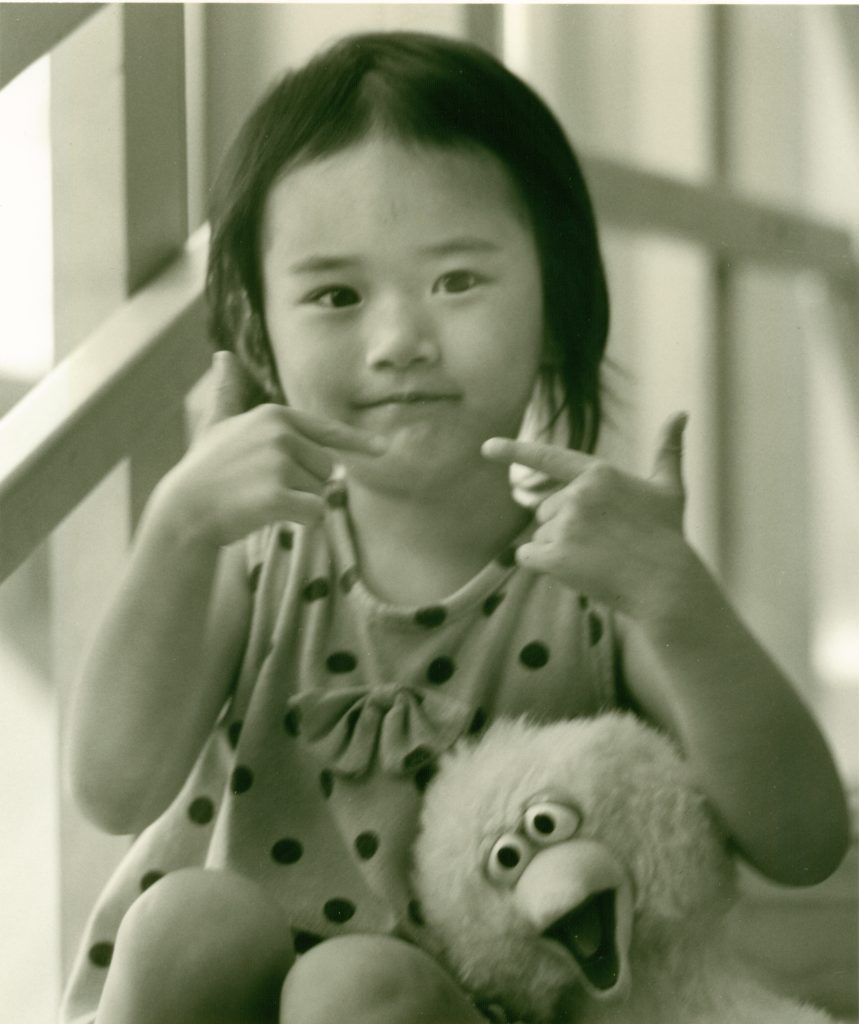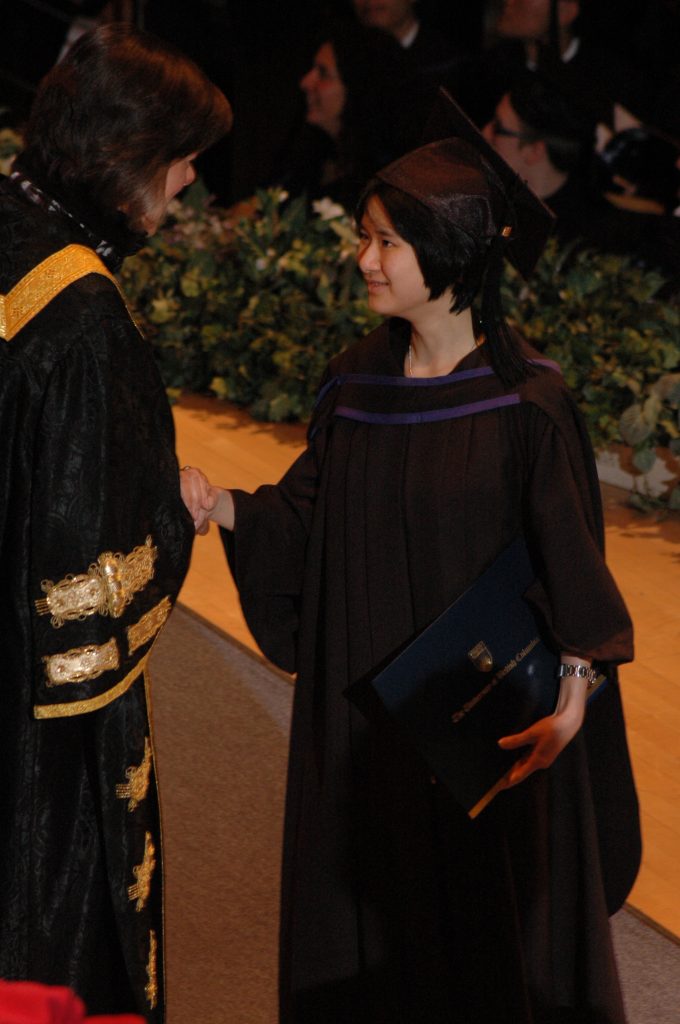by Rosalind Ho
I was born prematurely, in the middle of a prairie snowstorm. When I was 8 months old, I was identified with a severe to profound bilateral hearing loss as well as a delay in my motor skill development. I was fitted with hearing aids shortly after my diagnosis, and my parents enrolled me in a family-centered intervention program right away. My parents also learned how to communicate with me using both sign language and spoken English.
Our family received a lot of support from the intervention program, as well as from the parent group and other resources that the program provided, such as books and videos. An Infant Development Program worker visited our home once a month to help me develop my fine motor skills. I also attended regular physiotherapy sessions for the first few years of my life. My parents were very grateful for all the help we received from so many professionals. As an adult, I also really appreciate how much my parents did to get so much support for me so that I could have the best possible start to life.
When I was 3 years old, I lost the rest of my hearing. After much thought and discussions with professionals and other parents who had children with cochlear implants, my parents opted for a cochlear implant for me, which I received just before I turned 4. At that time, children would be given only one cochlear implant (CI). When I was almost 18 years old, I was re-implanted with a new CI device on the same ear, and then received another CI on the other ear a few months later. Now my cochlear implants are a part of me that my family doesn’t even notice.
I was enrolled in the BC School for the Deaf (BCSD) for elementary and high school, where all classes are taught in American Sign Language (ASL). The BCSD is housed in the same buildings as South Slope Elementary and Burnaby South Secondary. From Grade 3 onwards, I was mainstreamed into classes at South Slope and Burnaby South with an ASL interpreter provided by BCSD. During my high school years, I took some classes with Burnaby South Secondary and some with BCSD.
From the time I was a little girl, I have loved to read and to learn more about the world. I was fast-tracked through Grades 10 and 11 English, and I studied English Literature 12 in Grade 11, receiving 92% on the Provincial Exam. I also took several Advanced Placement (AP) courses in Grade 12, including AP English (courses offered to high school students that teach material equivalent to first-year university).
I went on to study English Literature at the University of British Columbia (UBC). My family immigrated to Canada from Hong Kong, which used to be a British colony that China ceded to Britain after they lost the Opium Wars in the 1800s. As I have always been fascinated by the language and complex history of Hong Kong, I spent nearly a year there as a university exchange student from UBC to the University of Hong Kong, and then as a co-op intern at an international law firm.
While still studying at UBC, I first worked at the Burnaby Association for Community Inclusion (BACI) as a co‐op student in the Human Resources department and then as a part-time Human Resources staff member. Since graduating from UBC, I have been working full-time in the BACI Finance department. I am also considering further studies in accounting.
I am passionate about advocacy for young people with hearing loss. I served as the President of the Canadian Hard of Hearing Association’s Young Adults Network (CHHA YAN) for four years. CHHA YAN is a network of young adults with hearing loss across Canada whose mission is to empower young hard of hearing adults to foster active leadership, provide peer support, advocate, and promote awareness of hearing loss in their communities. I then served for two years as the Young Adult Representative, a liaison between CHHA YAN and CHHA National. I am currently the President of the CHHA Vancouver Branch.
When asked what I think are the most important things for new parents to focus upon, my advice is:
- The Number One, numero uno, issue is communication. Find a way to communicate with your child as early as possible so that they can develop language. My personal opinion is that it does not matter what communication method(s) your family chooses as long as your child has a solid foundation for language development. It does not matter if you use sign language, spoken English, your native language, or some combination of all of these. Just communicate and connect with your child, in whatever way works best for your family:
- Involve your child in daily living and communication. When I was small, my mother would talk/sign to me while having me help her with chores such as laundry, food preparation, etc. This helped me to learn basic routines and simple conversations.
- Take your child out into the community. When I was a toddler, my mother took me to a weekly half‐hour story time at the local library. I would sit on her lap to watch and listen to a librarian read short children’s stories aloud and sing nursery rhymes. She also took me to gym classes for young children at the local recreation centre.
- Read to your child. Despite my enjoyment of the librarian’s visual storytelling with puppets and expansive gestures, hearing was still a challenge for me. My mother wanted me to learn English while my developing brain was still young enough to readily absorb it, so she arranged to borrow the books or songs to take home so that she could read them aloud and sign to me again every day.
- Form a strong support network of family, friends, and professionals. Find people who will listen to you when you need to talk, give you a hand when you need help, and support your choices for your child.
- Get siblings involved. My older brother often joined in the language games that my interventionists used to encourage me to practice my listening and speaking skills. I also credit much of my interest in reading to him, as he encouraged and bribed me into reading many novels and poems over the years. Nowadays my literary tastes range from Jane Austen to Harry Potter.
- Keep an open mind! Keep researching! A mind that is open to alternate communication or learning methods will allow for many more possibilities for your child. Don’t think that you have to do things a certain way just because your child has a hearing loss or because your family did things a certain way in the past. Also, don’t stop once you have made a choice, but keep researching to find out more information about it. Above all, be open and flexible to all possibilities — making one choice now does not mean that you or your child cannot choose to do things a different way as they grow older.
- Advocate! Make sure that your child has access to the resources (e.g. interpreters, FM systems, preferential seating, notetakers, etc.) they need to succeed at home, at school, and in the workforce. Also, teach them to have confidence in themselves and to be aware of their own accessibility needs so that they can advocate for themselves as they grow up.
The involvement of parents is essential to the development of a child, and their support and good wishes are deeply felt. One of the proudest moments of my life was the day I walked across the stage to receive my UBC diploma with my parents and brother beaming at me from the audience.



